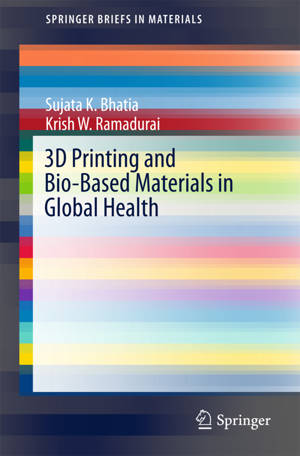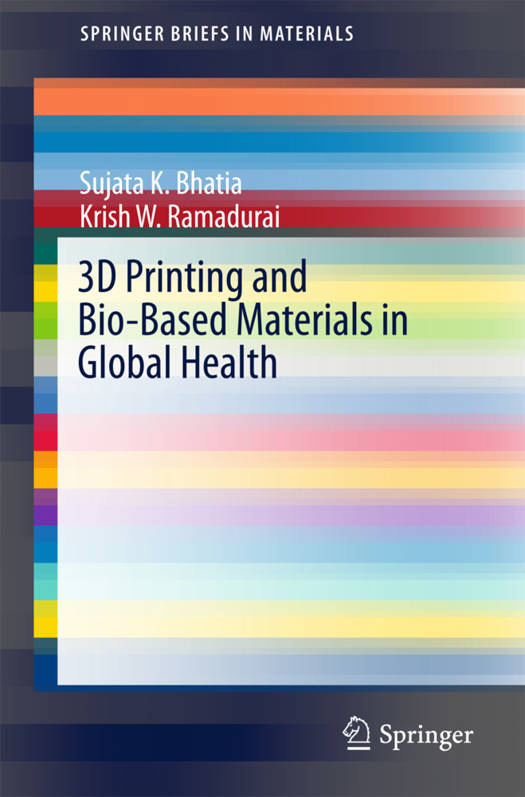
Je cadeautjes zeker op tijd in huis hebben voor de feestdagen? Kom langs in onze winkels en vind het perfecte geschenk!
- Afhalen na 1 uur in een winkel met voorraad
- Gratis thuislevering in België vanaf € 30
- Ruim aanbod met 7 miljoen producten
Je cadeautjes zeker op tijd in huis hebben voor de feestdagen? Kom langs in onze winkels en vind het perfecte geschenk!
- Afhalen na 1 uur in een winkel met voorraad
- Gratis thuislevering in België vanaf € 30
- Ruim aanbod met 7 miljoen producten
Zoeken
3D Printing and Bio-Based Materials in Global Health
An Interventional Approach to the Global Burden of Surgical Disease in Low-And Middle-Income Countries
Sujata K Bhatia, Krish W Ramadurai
€ 91,95
+ 183 punten
Omschrijving
This book examines the potential to deploy low-cost, three-dimensional printers known as RepRaps in developing countries to fabricate surgical instruments and medical supplies to combat the "global surgical burden of disease." Approximately two billion people in developing countries around the world lack access to essential surgical services, resulting in the avoidable deaths of millions of individuals each year. A fundamental barrier that inhibits access to surgical care in these locations is the lack of basic surgical instruments and supplies in healthcare facilities. RepRap printers are highly versatile 3D printers assembled from basic, domestically sourced materials that can fabricate low-cost surgical instruments on-site, ultimately enhancing the interventional capacity of healthcare facilities to treat patients.
Rather than focusing on one specific field of interest, this book takes an integrative approach that incorporates topics and methods from multiple disciplines ranging from global health and development economics to materials science and applied engineering. These topics include the feasibility of using bio-based plastics to fabricate surgical instruments via 3D printing sustainably, the application of "frugal innovation and engineering" in resource-poor settings, and analyses related to the social returns on investment, barriers to entry, and current and future medical device supply-chain paradigms. In taking a multi-disciplinary approach, the reader can gain a holistic understanding of the multiple facets related to implementing medical device innovations in developing countries.
Rather than focusing on one specific field of interest, this book takes an integrative approach that incorporates topics and methods from multiple disciplines ranging from global health and development economics to materials science and applied engineering. These topics include the feasibility of using bio-based plastics to fabricate surgical instruments via 3D printing sustainably, the application of "frugal innovation and engineering" in resource-poor settings, and analyses related to the social returns on investment, barriers to entry, and current and future medical device supply-chain paradigms. In taking a multi-disciplinary approach, the reader can gain a holistic understanding of the multiple facets related to implementing medical device innovations in developing countries.
Specificaties
Betrokkenen
- Auteur(s):
- Uitgeverij:
Inhoud
- Aantal bladzijden:
- 115
- Taal:
- Engels
- Reeks:
Eigenschappen
- Productcode (EAN):
- 9783319582764
- Verschijningsdatum:
- 3/07/2017
- Uitvoering:
- Paperback
- Formaat:
- Trade paperback (VS)
- Afmetingen:
- 156 mm x 234 mm
- Gewicht:
- 195 g

Alleen bij Standaard Boekhandel
+ 183 punten op je klantenkaart van Standaard Boekhandel
Beoordelingen
We publiceren alleen reviews die voldoen aan de voorwaarden voor reviews. Bekijk onze voorwaarden voor reviews.









